 newsitems
newsitems  CLRAE leaders to EuroFora: Cities/Regions can help fight the Crisis. CoE role proposed by Russia.
CLRAE leaders to EuroFora: Cities/Regions can help fight the Crisis. CoE role proposed by Russia.
CLRAE leaders to EuroFora: Cities/Regions can help fight the Crisis. CoE role proposed by Russia.
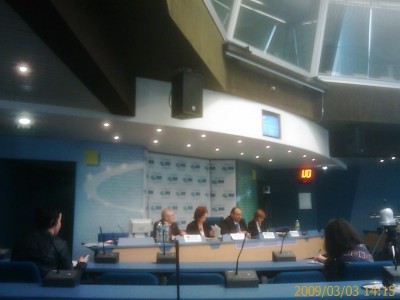
Leaders of the panEuropean Congress of Local/Regional Authorities, which make most Public Investments in the EU (210 Billion €), replying to "Eurofora"'s questions, expressed a strong wish to actively contribute to fight the Economic Crisis, and started checking a Russo-Ukranian proposal, supported by Romanian and other representatives, for a pan-European coordination of decentralised Economic Stimulus projects.
- "We (CoE) need to set up a Group of Experts to combat the Economic Crisis", concluded CLRAE's vice-President, Head of Russia's delegation, Svetlana Orlova, after a long CoE debate on the Financial crisis and Local/Regional Authorities, spread all over Wednesday and Thursday.
CoE's Local Democracy leaders, strongly stressed their will to act from the outset of a weekly session in Strasbourg, in reply to an "EuroFora" question, where we noted that LRAs deal with 2/3 of Public Investment in the EU, and, following the example of Strasbourg-located lower-Rhine County's Stimulus package (See 19/2/09 News), we asked if LRAs can help fight the Economic Crisis and how their actions could be coordinated ?
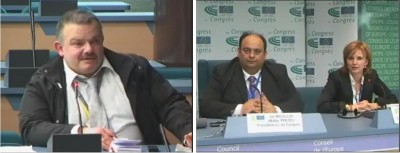
An appeal to get on board the Local and Regional bodies in a concerted effort, together with National Governments, to fight the Economic Crisis, was launched by the President a.i. of the PanEuropean Congress of Local and Regional Authorities (CLRAE), Dr. Jan Micaleff, replying to "EuroFora"s question :
- "I am more than convinced that Local Authorities can contribute to fight the Financial Crisis by Stimulus packages of creation of Jobs, right attitudes for Investment, etc", replied to "EuroFora" CLRAE's President a.i.
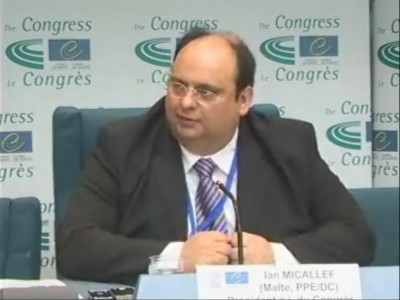
That's why, "my Appeal to National Governments is to get on board the Local and Regional authorities. Because there is a feeling that this is a problem which should be left entirely to States or to National Governments only". But, "we (CLRAE) feel that there must be a Concerted effort, not only of National Governments, but to get together and work together with Local and Regional governments, so as to create the right Stimulus to have a better Economy in our (CoE's) countries", concluded Dr. Micallef.
Adding a "comment to" EuroFora's "question on the role of LRA's in the fight against the Economic Crisis", CLRAE's vice-President and Chairman of the Chamber of Local authorities, Anders Knape, Head of the Delegation from Sweden (which will chair the EU from July to December 2009), cited concrete facts :
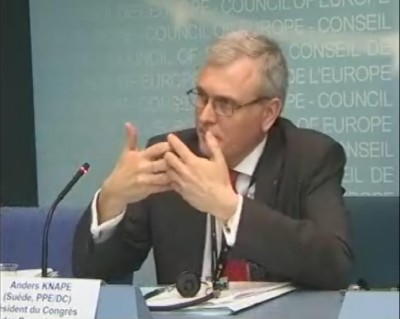
- "F.ex. in Sweden, 20% of GDP is handled by Local Authorities. 75% of all Public Spending are handled by LRA's. 25%¨of Employment is, in one or another way, working through Local Authorities. So, of course, if you have a situation with such a strong influence of Local and Regional Authorities in the Economic System of a Country, of course we have to play also a crucial role in helping to solve the financial Crisis".
- "And we can do it in many fields : Because we are also responsible for Water supply, for Heating, for Transport, etc. Within the need of all Europe for Investment in sectors, there is also need for Investment when it comes to restoring Schools, Hospitals, Elderly care Centers, etc. all this sort of Public Facilities that are in need to be more Energy-efficient, to be more and better equiped for the Future".
That's why, "of course, together with the Governments, ...we (LRAs) could play a crucial role to Stop Unemployment, to get New Investment in place, and to start now Investment that we had, perhaps, (initially) planned to make Next Year or the year after that", pointed out Knape.
- "So, it's really important, for all Europe, that LRAs will be involved in the Programs that now are discussed in the National Parliaments, because we have a very important role to play in this field", he concluded
Knape made it clear that he was "not only discussing the Government Grants for the Local and Regional levels, but ...a good Planning together with the National Governments".
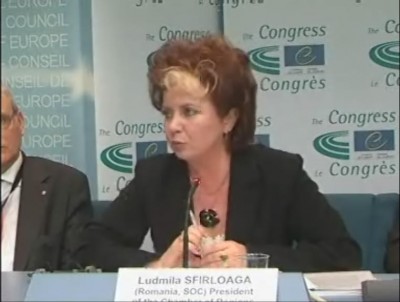
However, the other side of the coin was raised by another CLRAE leader : - "Referring to the same", EuroFora's "question", the CLRAE's vice President who chairs its Chamber of Regions, Ludmilla Sfirloaga, Head of Romania's Delegation, added "more, regading the Romanian example", as she said :
- "The Will of Romanian Local Authorities is very huge to solve this problem of the People", Sfirloaga declared. "But the problem is... that Financial Resources are cut down to 1/3 from last year. "We (LRAs) are trying to solve this problem with Public-Private Partneships. But this cannot be a solution. The main issue is how the Government will give us the Financial Resources, as we need, from the Law on the Budget", she concluded, revealing that "CLRAE was asked to monitor if the European Charter of Local Self-Government is respected".
President Sfirloaga, explained later to "EuroFora", that even if her own Party is now "in the governmental coalition", there are some "disagreements". But, certain "austerity measures appear mandatory", "rationnal and necessary", advised by the World Bank, according to the "9o'clock" Newspaper, which doesn't hesitate to criticize the government if it feels the need. For Romanian Prime Minister Emil Boc, "the savings ..to the Budget", are destinated "to have the necessary resources ..to support Economic Growth, and ..to fulfill ..Social obligations towards low and very low pensioners". He said that he wants to "cut the personnel expenditure", particularly "some allowances, incentives and bonuses", preferring to fund activities able to attract EU grants. If it's true, then an agreement with LRAs to focus on investments stimulating the Economy against the Crisis, should logically be possible.
There is an "urgent need to take preventive measures" by Cities to face risks for "reduction of own revenues", "mainly due to stagnation of property market, local taxes, etc", added later the vice-President of South-East Europe Municipalities' network NALAS, Mayor Vladimir Moskov from Bulgary.
Municipalities should "intensify dialogue and cooperation with central Governments" to help absorb available EU funds and point at interesting Investment projects, NALA recommends.
Public Investment made by Local/Regional Authorities in the EU represents some 210 Billion € (out of a total of 313 Billion €) in 2007 figures, according to a 2008 Study distributed at the CoE during the Debate which followed.
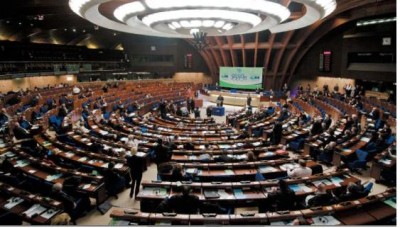
Moreover, Local and Regional Authorities, "in general, have less Debts than the State", observed keyone speaker French Mayor of Saint Etienne, Maurice Vincent. This is important at a time when several Banks show a trend to augment credit's cost.
Thus, f.ex. 210 million € will be invested by Saint Etienne City to Urban renovation, Energy efficiency particularly in Schools, etc., while also considering Technological Parcs, said Vincent.
It's preferable for Cities, instead of having to spend, otherwise, for large Social assistance, reparation or public order expenses, if the crisis worsens, he warned.
An appeal to "coordinate" efforts and to show "Solidarity", since "no country could face alone the crisis", was launched earlier by CoE Parliamentary Assembly's president, Spanish MEP Lluis de Puig.
The head of the PanEuropean Assembly warned of a "growing discontent", and "flashes of violence", while "the credibility of our Democratic Governments is at stake".
By helping join together Democracy and Economic revival, CoE can avoid errors made back at the 1929's crisis, when the accent was put only on Money, neglecting Democracy and Human Rights' values, with the well - known consequences, (Nazism and Fascism, 2nd World War and "Shoa", etc), warned CLRAE's vice-President, Head of France's Delegation, Jean-Claude Frecon.
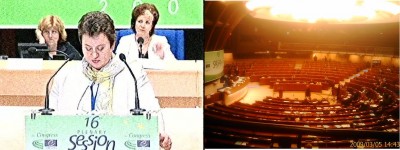
- Global Economic Crisis makes it more difficult to predict the Future, and aggravates inequality Gaps :That's why in Russia we focus now more on People's Social needs, said the Head of the Russian Delegation and CLRAE vice-President, Svetlana Orlova.
Meanwhile, in order to fight the Global Crisis, Russian President Medvedev has just made "proposals", including for a better regulation of International Financial Institutions, Arbitrage, etc., which were communicated to all partners in view of the April 2, G - Summit.
Inside Russia, the Federal Government gave, f.ex. 450 million rubles this year to Banks for capitalisation, and some 400 Billions were transferred back to Citizens. Prime Minister Putin is heading the work, which also earmarked 60 Billions to help People unable to pay their Mortgages, through a Stabilisation Fund, added Orlova.
In the real economy sectors, "we took some Unprecedented measures" to support "huge industries" in Russia, after Metal industry's results decreased in 2008 : Fex. "if I buy a Car, 2/3 of its price will be given back to me !", she observed.
Small and Medium Enterprises (SMEs), which grew +17%, mainly on infrastructures, roads, bridges, etc., are getting now 36 Billions, (instead of only 1 before), and reduced Taxes (including VAT).
But there are about 2 Million Unemployed People currently in Russia. Thus, since December 2008 the Government reserved 42 Billions for Regions to create "Community Jobs" for Unemployed People : -"If they don't like it, they can change", Orlova said. "Many Regions used that program", at the same time with re-Training to give People a second carreer, away of reduced segments.
For all these activities, Local and Regional authorities set up special "Working Groups" for coordination throughout all Russia, she concluded
- In Spain, 8 Billion € were earmarked by the Government for a "Local Investment Fund", for "urgent actions, particularly Job creation", by "doubling" the usual annual figure which was 4 Billions, said María Tena, Local Administration Director at the Spanish Government, CoE's chair-in-office. Municipalities have just presented in 2009 the Projects they feel responding to "real needs" : Big Cities prefer invest in Public Spaces, while Small Cities focus on equipment and infrastruture, Tena revealed.
- In France, some 70% of Public Investment is done by Regions, and afterwards Municipalities, noted Alsace Region President, Adrian Zeller, whose jurisdiction covers also Strasbourg. Currently we focus on Economic "Revival investments, Professional Training and Energy efficiency", added Zeller, insisting particularly in the creation of "New forms of activity".
- In Norway, among other practical measures, f.ex. Public Funds for Buildings, etc. were made "Faster, without the usual Bureaucracy", said the experienced former CLRAE President, Norwegian Halvdan Skard. This is one among many examples of Cooperation in the Public sector where local authorities are recognized as useful partners,
- Ukranian Mayor Yevgen Kartashov, preferred to speak "not only for one country each", since "noone could face the Crisis alone". Therefore, "we should work all together", he stressed. "Strasbourg could oversee" LRA's efforts throughout Europe, he suggested.
In a rare Russo - Ukranian joint move, the Head of the Russian Delegation to CLRAE, Mrs Orlova, concluded the debate by welcoming Kartashov's observation, and making a formal proposal :
- "We (CLRAE) need to set a Group of Experts to combat the Crisis affecting European Cities and Regions", Orlova said.
The idea was taken up by CRLAE's Chairwoman for Regions, CLRAE's vice-President, Ludmila Sfiriolaga, Head of the Romanian Delegation :
- "I shall make a formal Proposal to the (CLRAE's) Bureau to set up a Group" for coordination at a pan-European level of LRA's contribution to overcome the Economic Crisis, she anounced.
Which rare Strasbourg' chemistry succceeded to create this rare, but interesting for Europe, Russo-Ukrano-Romanian joint proposal ?
Was it an outcome of another key Debate on the "Black Sea EuroRegion", held the same week in Strasbourg, giving an opportunity to remind also the "Black Sea - Danube - Rhine", "Sea-River" ship transport link ?
Strategically based at Constanta, Romania's biggest Seaport close to Danube, it brings Energy-producing countries, as Russia and Azerbaidjan, directly at EU's Eastern front, composed by new EU Members Romania and Bulgaria (crossed by Danube river) and older EU Member Greece (biggest EU Ship transport country, before Cyprus), as well as Georgia (a fast link for Azerbaidjan, perhaps Iran, etc), Armenia (ibid.), Turkey (one of the links to Iraq etc, unless Bagdad restarts a faster pipeline via Syria), Moldova, etc.
Costanta's County, present during CLRAE's 2009 session here, is also the birthpace of Romanian President Traian Basescu, a former Ship Captain and later Minister of Transport, who crossed the Danube - Rhine junction since it was enlarged on 2001, and has strongly supported, in reply to earlier "EuroFora"s questions at the CoE in Strasbourg, the Black Sea - Danube/Rhine rivers' Highway for Energy transports from Asia, thanks also to Liquified Gas' New Technologies.
-------------------------------------------
Russia, Ukraine and Norway's active involvment in Strasbourg's CLRAE debates on how to fight against the Economic Crisis, brought larger added value to EU Regions' complementary debates, meanwhile transfered at nearby Prague :
EU Regions' committee (CoR), exceptionally enlarged to Cities, meeting there together with EU Commissioner Danuta Hubner, is consulted on EU Cohesion funds' Future, and the unfulfilled yet "Lisbon strategy" on growth by innovation, in view of strategic decisions due to be taken in 2010.
EU alone, before the 19-20 March 2009 Summit, has already planned a 200 Billion € Stimulus recovery plan, (1,5% of EU's GDP), while trying to accelerate the implementation of the already agreed 347 Billion € available for investment during the 2007-2013 period under EU Cohesion policy, observed EU Commissioner Danuta Hubner.
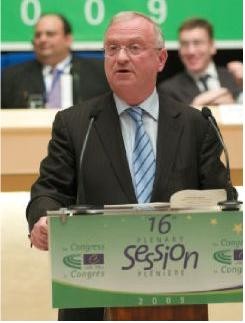
CoR's chairman, Luc van den Brande, president of CoE Assembly's EPP group, recently declared that "all governance levels should promote unity and take forward common ambitions and joint European projects, investing in competitiveness, energy efficiency", etc. "Local and regional authorities must be involved, with a view to strengthening Cohesion and safeguarding key Investments and Infrastructural projects". There is "a clear way forward", for van den Brande : "The need for integrated European action at all levels of governance and throughout the Union".
Will panEuropean CoE really help advance a (big) step further in a larger geopolitical area, when, and how ?
------------------------------------------------------
[NDLR : This is a consolidated, Public version from relevant News already provided to EuroFora's Donors/Subscribers in 2 successive Newsflashes dated 3 and 5 March 2009].
********************************************************
"KENnel" Strasbourg become an EU Pioneer ?
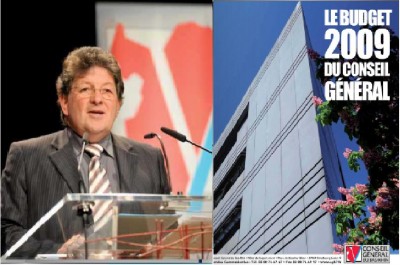
(PHOTO) Strasbourg-located lower-Rhine's County (Departement du Bas-Rhin)'s President, Guy-Dominique Kennel, starts looking as a Pioneer in Europe, since his initiative to launch a 757 million € generating Economic Stimulus plan on February 2009, with projects to start before June, and closer Cooperation with the National Government, (See "EuroFora" News 19 February 2009), inspired even the PanEuropean CoE...
It's true that the L.Rhine County's headquarters ared directly linked with EU Parliament, ECHR and CoE, since they are all located at the Riverside of one and same old Alsacian river...
****************************************************
Mutual inspirations between CLRAE and Strasbourg's Mayor Ries..
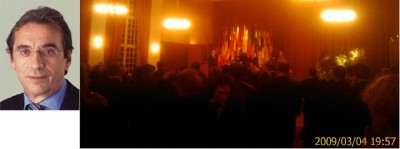
Strasbourg's new Mayor, Senator Roland Ries, when he reminded, at the traditional reception for CLRAE's annual session, that "there are 2 ways to build Europe : From above, with Governments and Parliaments, and from the grassroots, closer to Citizens, as also Cities and Regions gathered in Strasbourg try to do", appeared more busy than usual :
Leaving the reception immediately after his short speech, he had also to cancel his scheduled presentation of Strasbourg-Ortenau's "EuroDistrict" at CLRAE's Plenary, next day in the Council of Europe, where a German Journalist, "EuroFora", and others. waited in vain.. However, the scheduled comparison between Strasbourg's "EuroDistrict" and another "EuroDistrict" created among Cities of 3 Countries at the Adriatic Sea, (an idea of CoE's Expert, and former CLRAE President, Giovani Di Stasi, "inspired by Strasbourg-Kehl's example", as he told "EuroFora"), might have been interesting : Even if an obvious difference is that Stasbourg's EuroDistrict is focused mainly on the European Organizations concentrated here, another aspect, common to both "EuroDistricts" is also the creation of links between citizens of various cities and EU countries during their everyday life.
But the mystery didn't last long : Soon afterwards, it was found out that Ries, instead of neglecting CLRAE, on the contrary, he was rather .. inspired and motivated by its main 2009 Agenda issue : Local Authorities' role in the current struggle against the Economic Crisis ! To the point that he was preparing to present a "Plan to support Economic activities by Strasbourg's City", before formal decision next Monday, March 9. "All's good, that ends good", as they say..
Main Menu
Accueil Press Deontology/Ethics 2009 Innovation Year EU endorses EuroFora's idea Multi-Lingual FORUM Subscribers/Donors FAQs Le Elxis licence Recherche avancée EuroFora supports Seabird newsitems In Brief European Headquarters' MAPs CoE Journalists Protection PlatformBRIEF NEWS
- 00:00 - 02.06.2021
- 00:00 - 18.10.2020
- 00:00 - 19.06.2020
- 00:00 - 18.05.2020
- 00:00 - 20.04.2020
- 00:00 - 02.02.2020
- 00:00 - 09.12.2019
- 00:00 - 27.11.2019
- 00:00 - 16.11.2019
Popular
- Yes, we could have prevented Ferguson riots says World Democracy Forum's Young American NGO to ERFRA
- Spanish People Elect CenterRIGHT Majority with 1st Party and Total of 178 MPs (6 More than the Left)
- Pflimlin's vision
- The European Athletic "Dream Team", after Barcelona 2010 Sport Championship Results
- Source Conseil d'Europe à ERFRA: Debatre Liberté d'Opposants à Loi livrant Mariage+Enfants à Homos ?
- Head of BioEthics InterGroup, MEP Peter Liese : "Embryonic stem cell research reaching its END" !?
- Spain: Jailed Turkish Terror suspect with Explosive,Drones,Chechen accomplices stirs Merah+ Burgas ?
- UN Head Ban Ki Moon at CoE World Democracy Forum : - "Listen to the People !"
Latest News
- EUOmbudsmen Conference 2022: Digital Gaps affect People's Trust threaten EF Project on EU Future ?
- French Election : Black Out on Virus, but Obligation for Fake 'Vaccines" Challenged
- Both French Presidential Candidates point at "Humanism" in crucial times...
- France : Zemmour = Outsider may become Game Changer in Presidential + Parliamentary Elections 2022
- PACE President Cox skips Turkey Worst (Occupation) case compared to Russia (DeMilitarisation) query
Statistics
Visiteurrs: 56853875Archive
Login Form
Other Menu
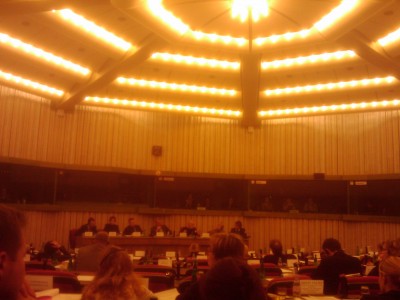
Facing a 70% Abstention threat in 2009 Election, EU endorses EuroFora's idea for Citizens' debates on crucial EU decisions !
- Different views on "Europe's Future", should be debated among Citizens at June 2009 EU Elections, thanks to political Parties' "Manifestos", says EU Parliament's Report
A main idea, initiated and promoted by EuroFora's founders since 1997: the vital need to develop European Citizens' democratic right to actively participate in multilingual debates on EU decisions, is formally endorsed by the EU from 2009 !
The move is a key attempt to overcome "catastrophic" Polls which warn that only ...30% of Citizens are ready to vote in the forthcoming June 2009 EU Election ! This was revealed by EU Commission's vice-president, in charge of Communication policy, Margot Wallstrom, during a "hot" meeting of EU Parliament's Committee on Culture and Education, during the December 2008 Strasbourg session.
Wallstrom faced criticism, but also suggestions from various MEPs, naturally worried by Abstention threats which herself found even "worse" than in 1999 or 2004...
A Report on "Active Dialogue with Citizens",examined at the same time, presented some useful practical tips, on "facilitating Interviews"; etc., but also a potentialy important call to "incorporate the conclusions of ...debates...into (EU) policies, and take into consideration the expectations that Citizens have of the EU when deciding". An amendment even implies that Citizens' participation in debates on EU decisions is a democratic "Right".
More importantly, it finds that a Debate "on the Future of Europe", (as French President Nicolas Sarkozy has asked since 2007), would be a good idea " for the 2009 European parliamentary Elections", because "clarifying the political differences between the EU political parties would help citizens to identify themselves with, and choose between various concepts", for which "all parties (should) present their Manifesto".
A "Joint political declaration on Communicating Europe in Partnership", co-signed by "the European Parliament, Council and ... Commission", confirms that they "attach the utmost importance to improving communication on EU issues", by "enabling European citizens to exercise their right to participate in the democratic life of the Union, in which decisions are taken as openly as possible and as closely as possible to the citizens, observing the principles of pluralism, participation, openness and transparency".
This should "enable Citizens to exercise their right to express their views and to participate actively in the public Debate on European Union issues", while also "promoting the respect of multilingualism". In this regard, EU confirms its "wish to develop synergies with national, regional and local authorities as well as with representatives of Civil Society".
It's since 1997 that a group of EuroFora's founders have officially presented a pioneer Project (then called "EIW", for "Europe in the World"), which aimed to develop Strasbourg's "Polyphonic music", by providing "Interactive information", on "main issues ... during the Decision-making process of European Organizations which engage in Transparent and Public Democratic Debates"
This should be done, inter alia, by "exploring the potential of New Communication Tools (mainly Internet)", as well as classic-form debates, the 1997 EIW pioneer project's anounced in its "Synopsis". It was formally "accepted for evaluation" by EU Commission in Brussels in order to be examined for a grant in the framework of the "Research/Technology/Development (RTD) Programme in the field of Information Technologies", then called "ESPRIT", as a "Best Practice Pilot Project".
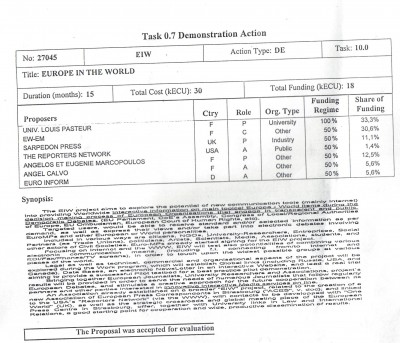
But the vital, urgent Political need for EU to search new, efficient ways to reach the People and interact with European Citizens, was really felt in Brussels and elsewhere only after the unprecedented in History 1999 and 2004 Majority Abstention in EU Elections, followed by 3 "NO" in Referenda in France, the Netherlands and Ireland, on 2005 and 2008...
In this New Political Landscape, we prepared a new, actualised and more developed version of our initial idea, in a simplified and more efficient form, thanks also to a large Experience accumulated during many years of EU/CoE/UNO Press work and Multi-lingual debates, with the New project "EuroFora" :
On 2006 we presented in Public its main lines during Questions/Replies that we raised at two Press Conferences by EU Commission President, Jose Baroso, and mainly EU Commission's vice-President, in charge of Communication policy, Margot Wallstrom, together with EU Parliament's vice-president, Alejo Vidal-Quadras, in Strasbourg, (Videos available), and we reminded it at various brief contacts with Commissioner Wallstrom in 2007 and 2008.
Meanwhile, a new Text was also presented for "EuroFora" Project mainly to certain Political and other personalities, at European, National or Regional/Local level, mainly in 2007, but also in 2008..
Now, after the unexpected 2008 Irish "NO", and before the 2009 EU Elections, which are due to be of exceptionally crucial importance for Europe's Future, the moment has obviously come to launch that project, progressively, but in real practice.
Whoever really cares for Europe and its Citizens is welcome to join, in one way or another. Only anti-European, anti-democratic, obscure or ignorant groups might oppose or attempt to "steal" and deviate the main idea.
But European Citizens, incited by enlightened political leaders, are those who will finally write the real History.
Polls
SMF Recent Topics SA
- Record Hospitalisati... (0) par Breadman
- How Many Infected by... (1) par Thunderbird
- Real Cause for Europ... (0) par Breadman
- Interesting Australi... (0) par Aurora
- Plus de mRNA Faux-&q... (0) par Aurora
- EU: Lukashenko as E... (0) par WKalina
- Why NATO in Ukraine,... (0) par Geopol
- Afghanistan's key : ... (0) par Thunderbird
- Anti-Pass Demonstrat... (0) par Aurora
- Veran - Fioraso : Mê... (1) par JohnsonE


















